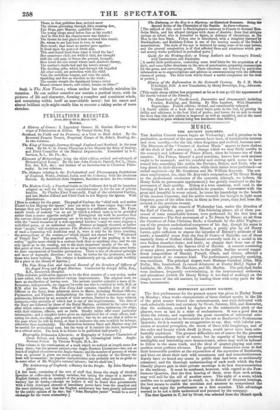MUSIC.
THE ANCIENT CONCERTS.
THE Ancient Concert season began on Wednesday; and it promises to be productive, as several of the past seasons have been, of considerable interest and even novelty,—for the old, when forgotten and revived, becomes new The Directors of the "Concert of Ancient Music" appear to have shaken off the sloth of half a century; a change which we may fairly ascribe to the examp:e and influence of Prince Albert, since he became one of their number. The Prince, himself a good musician, knows how such matters ought to be managed; and his youthful and stirring spirit seems to have roused into something like action the Prelates, Dukes, and Earls, who so long dosed in their directorial chairs, While their duties were performed—or rather neglected—by Mr. Greatorex and Mr. William Knyvett. The con stant employment, too, since Mr. Knyvett's resignation, of Sir Henry Bishop as the professional conductor of the concerts, (though, we believe, Sir Henry holds no permanent appointment,) has greatly conduced to the ins, provement of their quality. Bishop is a true musician well read in the learning of his art, as well as skilled in its practice. musician, with the great and beautiful in every school, he turns his knowledge to the benefit of the Ancient Concerts; and his active research has brought to light more forgotten gems of the olden time, in the or four years, than lied been dis- covered in the previous twenty. Of this activity the concert of Wednesday last, under the direction ot the Earl of Cawdor, gave proof. The following pieces, all of them pos- sessed of some remarkable feature, were performed for the first time at these concerts—The first movement of a Te Deum by Hasse; an air from the Carattaco of John Christian Bach; a Graduate by the Abbe Vogler,— one of the greatest ecclesiastical composers of his day, though his name is tarnished by his conduct towards Mozart; a pretty glee by old Henry Lewes, quite sufficient to expose the injustice of Burney's estimate of hiss merit; a beautiful scena from the Inez di Castro of Bianchi; one of those masterly duets of Steffani which Handel avowedly took for a model in his own Italian chamber-duets-' and lastly, an elegant duet from one of the operas of Buononcini, the famous rival of Handel. A concert containing so many pieces previously unknown to the public, besides several magni ficent compositions of Handel, Purcell, Gluck, and Graun, afforded a musical treat of no common kind. The performance, generally speaking, was excellent. The principal singers were Madame Caradori Allan, Miss Dolby, Mrs. Sunderland, (a recent debutante at Exeter Hall) Signor F. Lablache, Mr. Allen, Mr. Hawkins, and Mr. Machin. The principal faults were loudness, frequently overwhelming, in the instrumental orchestra; and alterations (which Sir Henry Bishop is too fond of making) on this simple scores of the old masters, by loading them with noisy parts for the brass instruments.


























 Previous page
Previous page